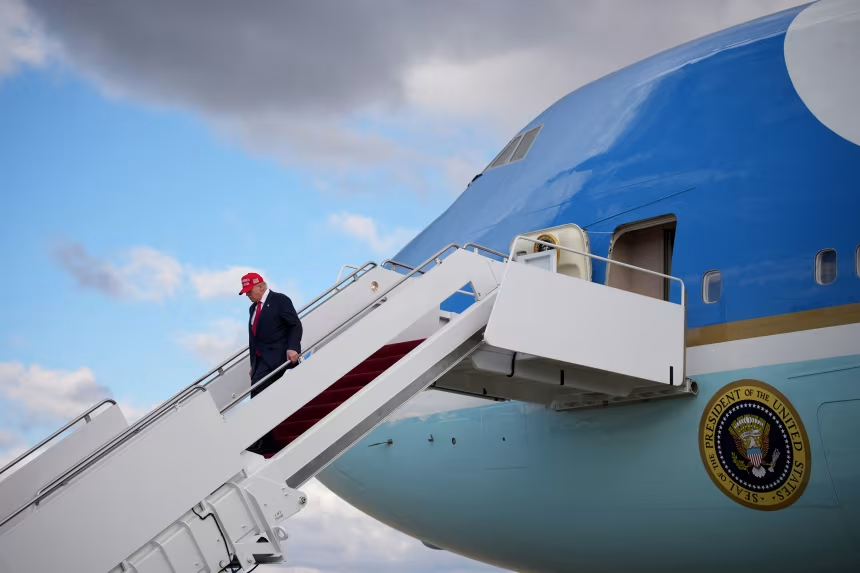Washington, D.C. — Former President Donald Trump on Thursday called on congressional Republicans to unilaterally end the ongoing government shutdown by eliminating the Senate filibuster — a dramatic escalation that risks reshaping negotiations already underway on Capitol Hill.
In a post on Truth Social, Trump urged GOP lawmakers to invoke what he described as the “Nuclear Option” and abolish the 60-vote threshold currently required to advance most legislation in the Senate.
“It is now time for the Republicans to play their ‘TRUMP CARD,’ and go for what is called the Nuclear Option — Get rid of the Filibuster, and get rid of it, NOW!” Trump wrote.
The directive landed just as lawmakers believed they were inching toward progress. Instead, Trump’s statement is expected to complicate the delicate bipartisan talks to reopen the government, which entered its fifth week and is on the verge of surpassing the longest shutdown in U.S. history.
Republican Leaders Resist Calls to Overhaul Senate Rules
Top Senate Republicans have consistently opposed eliminating the filibuster, arguing that the rule protects minority-party rights and prevents sweeping partisan legislation from passing whenever the balance of power shifts.
Senate Majority Leader John Thune reiterated that stance earlier this month, describing the filibuster as a critical guardrail.
“This has been a bulwark against a lot of really bad things happening with the country,” Thune said, adding that he had received no pressure from the White House to consider changing the rule — at least until Thursday’s surprise pivot.
The 60-vote threshold, unique to the Senate, allows at least 41 senators to block legislation from reaching a final vote. Because no party has controlled 60 or more seats in decades, the rule forces compromise and often slows sweeping reforms.
Trump Warns Democrats Will End Filibuster if GOP Doesn’t
Trump argued that eliminating the filibuster would give Republicans the leverage they need to immediately break the funding deadlock and reopen the federal government.
“Now WE are in power… it would IMMEDIATELY end this ridiculous, Country destroying ‘SHUT DOWN,’” he wrote. “If the Republicans are not using the Great Strength and Policies made available to us… the Democrats will exercise their rights, and it will be done the first day they take office.”
His comments reflect a growing frustration among conservative activists who believe GOP leadership has been overly cautious during the shutdown standoff.
Shutdown Fallout Widens Across the Country
As the shutdown stretches toward the 35-day mark, millions of Americans are bracing for significant disruptions:
Federal food assistance programs are expected to run out of funding this weekend.
Thousands of government workers remain unpaid.
Transportation officials warn that pressure on air traffic controllers could threaten flight safety and schedules.
The White House underscored aviation concerns Thursday by holding a roundtable with airline executives and union leaders, seeking to highlight escalating strain within the transportation system.
Negotiators See Progress — But Not Enough
Earlier in the week, lawmakers from both parties hinted at incremental movement toward a compromise. Still, congressional aides acknowledge that any deal remains distant.
The Senate is not scheduled to reconvene until Monday evening, leaving lawmakers with little time to prevent further economic fallout.
Political Calculus Shifts
Trump’s push arrives at a moment when Republican leaders hoped to contain internal pressure. By publicly endorsing the nuclear option, he may face resistance from traditional conservatives who fear that removing the filibuster could backfire if Democrats later regain power.
Opponents warn the move would pave the way for:
Expansive federal programs
Major election law changes
Far-reaching regulatory reforms
Supporters, meanwhile, argue that the shutdown has reached a point where bold action is necessary.
Uncertain Path Ahead
With no immediate plan on the table and the Senate days away from returning, the shutdown now appears poised to deepen. And Trump’s call to dismantle a bedrock Senate rule has injected a new ideological fault line within the Republican Party.
As the crisis intensifies and public frustration grows, lawmakers face mounting pressure to end the stalemate — whether through compromise, procedural change, or political brinkmanship.
This story will continue to be updated as developments unfold.

